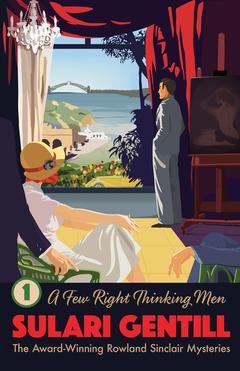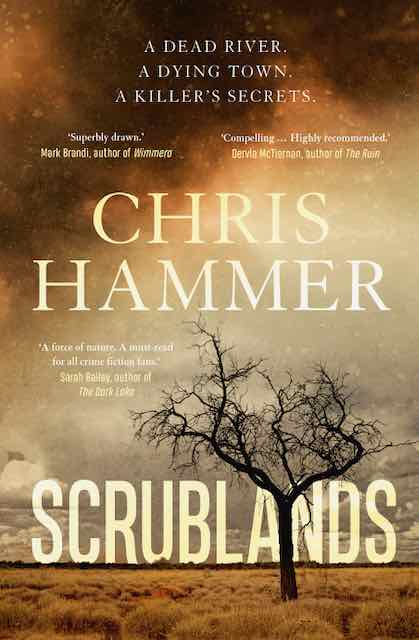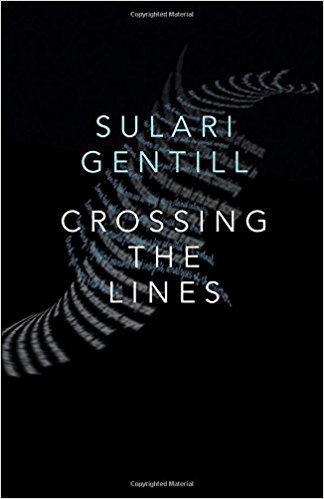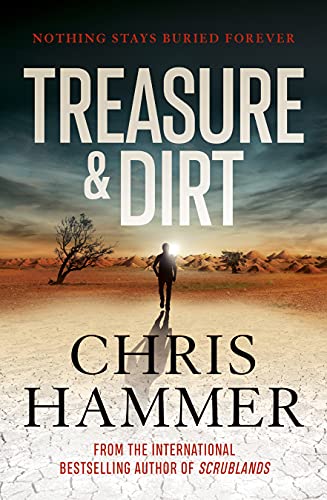This author talk was not one of my usual series – that is, not ANU/Canberra Times Meet the Author or Muse Canberra‘s conversations. Instead, it was presented by the Friends of the National Library of Australia, of which I am a member. Despite the cold, drizzly night, it was a full house, which is not surprising given the topic was crime fiction and the participants two local-ish, successful crime writers.
The event was MC’d by Nancy Clarke, from the Friends committee. After acknowledging country, she introduced the subject of the evening, and pointed us to a recent post on the NLA Blog on Australian crime fiction. She then introduced our authors and moderator:
- Sulari Gentill: author of 15 novels, including 10 in her Rowland Sinclair series, since 2010, and winner of Ned Kelly and Davitt Awards.
- Chris Hammer: author of two non-fiction works, and, since 2018, of 6 crime novels. And, winner of several awards.
- Anna Steele: reviewer of crime and other fiction for local newspapers, including, currently, the City News. Before retirement she was Head of English at Canberra Grammar School. (She is also a friend of mine, through our local Jane Austen group).
The conversation
After also acknowledging country, Anna explained that the focus of the evening was the craft of crime writing, and suggested they start with how and why they became successful crime writers.
The ever-entertaining Sulari – I’ve heard her before – explained that she had been a lawyer, but also loved hobbies. After trying many, including welding, she thought she’d try writing. Very quickly, it “felt just right”, and she knew she wouldn’t stop. She lost interest in law. Her first foray was writing mythic fiction.
That was the how, more or less. As to why crime, she said that her main reader, her English history teacher husband, found mythic fiction a challenge. He suggested she write “something with names you can pronounce”, and that including a murder might be good. Now, writers, she said, are obsessed, and often “absent”, so living with them can be hard. Given she didn’t want to give up writing or her husband – see what I mean about ever-entertaining – she had to make these two worlds work. So, she looked at her husband’s history thesis on 1930s Sydney and found her subject.
Chris started by quoting Balzac’s “behind every great fortune is a great crime”*. He jokingly said that turning to crime writing was easy because he got sacked! Actually, though, the trajectory was a little more complicated, but the gist is that after writing two low-selling non-fiction works around 2010, he returned to his journalism career. But, he missed writing, so decided to “have a crack at making things up”. He wrote Scrublands (2018) and got a publishing deal after an exciting auction process. His timing was perfect, as he wrote it just after Jane Harper’s huge success with The dry.
As to why crime for him, it was because he didn’t feel he was a good enough writer for literary fiction (his main reading go-to) and he didn’t have an idea. Also, he added – only partly joking – having been a journalist he really “wanted to kill someone”! He liked American hard-boiled writers like Dashiell Hammet, the Australian Shane Maloney, and, in particular, Peter Temple, who had shown the way in terms of combining plot, character, human drama, action.
Anna then asked, Where did their great characters come from?
Chris replied that Martin Scarsden was not based on himself. But, not knowing anything about police work and detectives, and given journalists are experienced investigators who poke their noses into things, he decided to make his protagonist a journalist. Martin, then, is based on his knowledge and experience, but not on his character. However, through his career as a journalist he had met many career war correspondents who were messed up. Scrublands is a redemption story for Martin.
Sulari talked about the challenge of deciding on her character. 1930s Sydney was highly class-based. She needed a character who came from a comfortable background, but who could walk easily among all classes. Then she had an epiphany, he could be an artist, as artists tend to accepted across the social spectrum. Also, she paints, and although she is not a painter, she understands how a painter looks at the world. Authors don’t need to be the same as their protagonist but it is useful to have some link with the character (like Hammer and his journalist.) She talked about some of the other ongoing characters, and why she created them. For example, she didn’t want to write sex scenes, but Martin needed romance, so she created an unrequited love for him.
Are they plotters or pantsers? (Some audience members didn’t know these terms, so for those here who don’t, plotters plan their plots out in advance – albeit to different degrees – while pantsers write “by the seat of their pants”.)
Both laid claim to being pantsers, though there was a little repartee about this at one stage with Sulari suggesting that someone who writes multiple drafts, as Chris does, can’t be a pantser. Chris retorted that if you only write one draft, as Sulari does, you must be a plotter! As Chris said later, if you get 12 writers together in a room together you’ll have 14 different ways of doing things!
Anyhow, back to the question. Notwithstanding Chris’ dig (and I’ll add here that these two get on very well), Sulari claimed to be an “extreme pantser”. She does no plotting at all; she has no idea who is going to die, let alone who did it. She writes while in bed, watching television shows like Midsomer murders, Lewis, etc. She believes, as author Kylie Ladd suggested, that this distraction enables her prefrontal cortex (our creative centre) to come up with the words. She’s not sure if this really is how it works, but she’s been writing this way for so long she doesn’t want to “poke around” in case it breaks the magic! So, things pop into her mind as she’s writing, and they will “suddenly” drive the narrative. Her novels are conversations with the reader about things she’s thinking about.
Chris is also a pantser, though not quite so extreme. For him setting is the critical thing – it’s how you cast a spell and invite the reader in. He might have a murder in mind, and a framing idea, but he won’t know who did what. He couldn’t be a plotter, because he would find it boring to know all in advance, and just have to “get on with it”. That Hollywood image of a book appearing to authors fully formed rarely happens.
Why leave behind successful characters? (As Sulari did with her metafictional Crossing the lines, and Chris in his shift to a police procedural series.)
Sulari said that her first book had been seen as literary fiction, but from then on they were slotted as genre. This separation of “serious” and “elite” from “just enjoyable” irritated her, so she wanted to try literacy fiction; she wanted to write a novel that explained how characters take on agency, and that explored the line between imagination and reality. Ironically, the book ended up including a crime! She sees this book, Crossing the lines, as her truly “novel” book, because there’s not other like it. She needed to do something different.
Chris was aware that booksellers need to know where to shelve your books. A police procedural is easy in that regard. Hence, Treasure and dirt, which was intended as a stand-alone, but has ended up not being so! Also, by end of third Martin Scarsden book, he could think up more crime but didn’t want just “mechanistic investigators”. He likes them to have “skin in the game”. Martin does appear in this new series, and he will probably return to Martin and Mandy in the future.
Then, Anna just had to ask him about his amusing character names. He said he got bored with plain names; he likes Dickensian names; and his editors didn’t complain! One reader has told him that his distinctive names help her keep track of who’s who in his complex plots.
Q & A
On how their “first readers” and drafting process works: Sulari’s husband – her first reader – sometimes sees a chapter at a time, sometimes sees the whole in a “last minute flurry”. He helps with plausibility. As a historian he can advise on the right tone in the language for her period, but as a grammarian and English teacher he will fuss over grammar and want to add adjectives! For Chris, journalist friends read his first book, but now, with the best editors in Australia, they are his first readers.
On their writing schedule/fitting writing into life: Sulari would rather write than do anything else so it’s easy. She does other things first, then settles down to her writing. She writes 1000 words a day, which results in a novel in 3 months. (Writing is like a relationship: you are passionate at the start; then it’s like a long-term marriage and you have to work. By the end you hate the “damn thing”, but when you come back to it you love it again.) Chris is at the stage where he has no kids, and no other job, so he has time. He is addicted to writing, and writes anywhere, including trains and noisy cafes. In the first part of the year he runs out of steam by lunchtime, but as year wears on, the book captures him and he thinks about it all the time.
On getting started, and what they wish they’d known: Chris said the best thing is to enter unpublished manuscript competitions, many of which are for debut authors. Also, try to find an agent, particularly for fiction. Read the acknowledgements at the end of books to get useful names of publishers, agents, editors. And get used to being rejected! Sulari said that it can be hard to get an agent, and they don’t guarantee getting published, but they can mitigate your gratitude to publishers when it comes time to sign the contract!
Conclusion
This was an excellent conversation because Anna used just a few well-targeted questions which kept it closely to the brief, the craft of crime writing.
Anna concluded by quoting Canberra thriller writer, Kaaron Warren, who recently said at the Bristol CrimeFest:
“I have a theory that people who deal with murder and death are always jolly in person … I mean have you ever met a miserable butcher?”
We all laughed and went off into the cold Canberra night feeling well-pleased with the effort we’d made to come out. Big thanks to the Friends, Anna, and our two writers, Sulari and Chris.
* The actual quote is, apparently, “Behind every great fortune is a crime”.
Author Talk: the Craft of Crime, Sulari Gentill & Chris Hammer with Anna Steele (Friends Event)
MC: Nancy Clarke (Committee of the Friends of the National Library of Australia)
National Library of Australia
Wednesday 5 June 2024






Having discovered Jane Harper entirely fortuitously, I was disappointed with Chris. But I will readily give him 10/10 for “particularly Peter Temple”.
Robert Galbraith (JKR)’s series of Cormoran Strike novels is so very brilliant that I hereby plump for plotters – coz there’s no way she didn’t do with him what she did with Harry. I scarcely ever buy a one-off audiobook from Audible, being dedicated to finding writers who’ve already put their feet on the road to a series.
I thought (knew) you’d like the reference to Peter Temple, M.R. This is where I should add that Mr. Gums didn’t like Peter Temple’s Truth at all (though I did) but he’s read and enjoyed several of Chris Hammers’.
Of course I haven’t read any Robert Galbraiths but I know a few people who like them.
This was such a delightful account of the event – I wish I had been there.
Thanks so much Carmel … it was delightful. Informative but delivered with a sense of humour.
Yes, it sounds so relaxed and entertaining – also informative. I did like the fact that both writers can write while other things are going on around them – cafes and television.
Are you one of those too, Carmel? You’ve just made me think. I can write blogs, letters (me weekly one to my American friend), emails etc while other things are going on, but I can’t read. I can’t even read to music. Different parts of the brain?
I never understand about ‘different parts of the brain’, although I know the expression is accurate. I realise different people tolerate (or feed on) different surrounds – sights, sounds, company etc when they write. I like physical comfort – I have a perfect little couch for writing in my study – but I also write just about anywhere. If there is music, it needs to be music I like.
I consider my whole house to be my study, really. And cafes and parks and gardens and riverbanks and libraries and trains – just about anywhere. I don’t think I have written in the bath, but I do write in bed. Well, Proust is an inspiration there.
I can read in a cafe – but I agree with you – reading seems to require maybe more serenity than writing – but of course I read on trains etc. What all this comes down to, I think, is that I don’t require peace and quiet for writing. However, I can also write in a silent place.
Haha, Carmel, how can we lay-people understand the mysteries of the brain. We just use it, and hope it stays in working order.
I like the fact that your whole house is your study. I can understand that. And, you made me think about reading. I can read in cafes, on public transport etc, but music that I like distracts me.
I like this quote: “people who deal with murder and death are always jolly in person…” We discuss something similar in horror communities, that is, how horror fans are always the sweetest people. Many of them have gobs of empathy and are anti-violence to most anything — literally, the don’t-harm-a-bug types. I hadn’t considered how those who read and write crime novels may be similar . . . Perhaps it’s because we experience violence and death in a safe space, and if we are learning what it means to be violent and how terrible it is, but with the luxury of not experiencing violence first hand. Most people I know who refuse to watch any kind of violence have seen it up close or are so empathetic that they feel like they are simultaneously experiencing what they see.
It was a lovely point to close on, I thought, Melame. I don’t think I fall into any of those camps, though. I just hate seeing violence, and I just can’t feel it as escapism. I think this is why, of crime, my favourite is police procedural because there’s less focus on the crime, and criminal.
I appreciate when the bloggers who are more into crime fiction note if there is a lot of violence or more detective work, etc. There can be a big difference.
I’ve never thought about that Melanie in crime reviews, I guess because I rarely read crime reviews/posts but I’m going to try to remember this. Probably any I write about are/will be low in violence anyhow so you crack probably take it as read.
We have a couple of Chris Hammer’s books mainly for Mr P. I’m too busy with other books. I had never heard of mythic fiction. Looks like a fun night and well done for going out into a cold night. I can relate to that now.
Haha Pam … re the cold night! And, same here re Chris Hammer. Mr Gums has read a few of his books but I’ve yet to.
That was an entertaining account thank you WG – or perhaps an accurate account of an entertaining evening. I’ll have to see what the WA library/audiobooks system has from these two. Audible doesn’t have Crossing the Lines but it sounds like it might be worth chasing up.
The latter I think Bill – it’s the evening that was entertaining! Like you I’d be interested in Crossing the lines. Given your criticisms of The dry, I’d be interested in your response to Scrublands. Hammer is Aussie so hopefully his setting will ring true to you.
Ok, I bought it. I’ll see how I get on with fictional Riversend. I just hope I remember why I bought it when I get round to listening to it.
This is Scrublands? Haha, I know what you mean about remembering why one is reading (listening to) a book sometime down the track.
Thanks Sue
I enjoyed this. My Mother has just read Scrublands and was very taken with it. You’ve given us some good talking points – and piqued my interest in reading both authors.
Paula xxx
Regards
Oh thanks Paula, lovely to hear from you. I’m glad your Mum enjoyed the book. I’m keen to read it, because although I’m not much into crime , rural (or drought) noir does appeal. And Gentill’s 1930s historical crime books sound interesting.
Hahaha over the good-natured back-and-forth dialogue about plotters and pantsers. It’s such a Thing in writing circles. As with (nearly) everything else, I don’t see why one must choose; I think there are instances where one method works well and instances where the other triumphs. /shrug But I wish I gravitated toward either/or thinking, so I could believe for a moment that I truly belong in that one side (or the other). lol
Oh yes, Marcie, I’m a self-confessed wishy-washy, meaning I’m very much both “on one hand” and “on the other hand”. Sometimes I frustrate myself. However, I suspect that while there are grey areas between pantsers and plotters, writers’ temperaments probably result in their falling mostly in one camp or the other?
Ohhh, yes, I find myself VERY frustrating. lol Even while I was writing the comment, I was thinking, but MOSTLY you’re a planner. And you might want the charm of some whimsy but there’s very little pantser in you, c’mon admit it. But I didn’t. heheh But, seriously, I think where it really is muddy is with the writers who publish in multiple forms, so they might be very methodical when they write an essay but, when they write a play, they allow it to unfold without restrictions. Or someone who writes crime novels, with those tidy-little-timelines, but when they are between projects they sit down with a notebook and poems spew forth and remain unedited. And what about the writers who create under-the-influence deliberately (so they plan to get to that state, but, then, is the work planned or pantsed). So, then, is it temperament, or is it habit, or something else entirely. However, this was an event with novelists, so really only one form was up for discussion. So I guess I’ll conclude by saying, some of my best friends are pantsers.
Haha, Marci…. some of my best friends are pantsers, after all that, made me laugh.
I’m like you … more planner than pantser, but then if you are doing the sort of writing I do (essays/articles/reviews) that makes more sense as you say. I suspect that if I wrote fiction I’d still be more planner than pantser, but I can understand being different for different forms. (I think if you wrote under the influence, you might plan to be under the influence but the writing that ensued would be more pantser? My, we are taking this seriously.)
IKR?! lol So I think we’ve revealed our planner-natures after all!
I somehow think we have!!